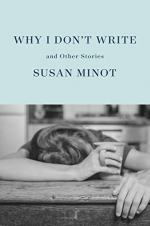
|
| Name: _________________________ | Period: ___________________ |
This test consists of 5 multiple choice questions, 5 short answer questions, and 10 short essay questions.
Multiple Choice Questions
1. In "While It Lasts," what does Isabel claim is "antisocial" (80)?
(a) Refusing to drink alcohol.
(b) Leaving a party early.
(c) Falling in love.
(d) Inside jokes.
2. On page 66 of "Why I Don't Write," what is the subject of the only article the narrator reads all the way through?
(a) A missing child.
(b) A traffic accident.
(c) A suicide.
(d) A bombing.
3. In "Why I Don't Write," what does the narrator have a dream about?
(a) Diamonds.
(b) Lobsters.
(c) Sledding.
(d) Baseball.
4. In "Café Mort," what occupies the attention of the "beige woman"?
(a) The small dog she has in her purse.
(b) The man with dark-rimmed eyes.
(c) The cooks.
(d) A miniature television.
5. In "Café Mort," why does one of the customers always refer to himself using plurals?
(a) He is a twin.
(b) He is mentally ill.
(c) He is unaware that he is dead.
(d) He is a monarch.
Short Answer Questions
1. In "Café Mort," how did Karen's little brother die?
2. In "While It Lasts," why is Bonnie unable to hear the last thing that Mr. Buffy tries to tell her?
3. In "Café Mort," what does the narrator guess about Maggie?
4. In "Why I Don't Write," what claim is made about the impact of having children on female writers?
5. In "Boston Common at Twilight," what is Ned's reason for going to Boston Common?
Short Essay Questions
1. In "Boston Common at Twilight," what is implied by the last section of the story, that takes place as Ned grows into adulthood?
2. On page 73 of "Why I Don't Write," what is the effect of the single word change from "I don't read it anymore" to the later item "I don't read anymore"?
3. In "Café Mort," why would some of the waitresses be "proud" of their jobs (89)?
4. In "Boston Common at Twilight," what alternative place to stay is available to Ned, and why does he prefer to stay with his aunt?
5. In "Boston Common at Twilight," what television show does Ned secretly watch? Why does he enjoy it?
6. In the second paragraph of "Why I Don't Write," what is the implication of the list following the phrase "then it all stops" (65)?
7. In "Boston Common at Twilight," why does Ned not try to get away or yell for help?
8. In "Café Mort," what evidence is there that the narrator is ready to leave her grief behind even before Anita speaks to her?
9. In "Why I Don't Write," what is the rhetorical purpose of the images of people looking at their phones?
10. In "While It Lasts," why does Bonnie think that George is a particularly good match for her?
|
This section contains 1,026 words (approx. 4 pages at 300 words per page) |

|




